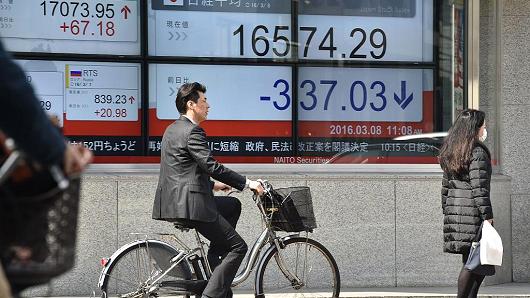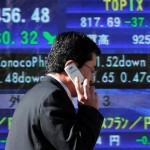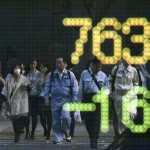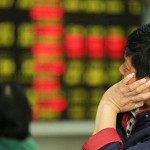Asian Stocks Rise With Won on China Trade Data; Oil Above $50

-
Chinese imports rose in yuan terms for first time since 2014
-
Shanghai, Hong Kong shares pare losses as kiwi strengthens
Asian stocks recovered from earlier losses and South Korea’s won extended gains as Chinese trade figures added to evidence the world’s second-biggest economy is on the mend. Crude oil traded above $50 a barrel.
The MSCI Asia Pacific Index climbed to a six-week high as shares in Shanghai and Hong Kong pared losses after data showed China’s imports rose in yuan terms for the first time since 2014. Futures on the S&P 500 were little changed after the benchmark closed within 1 percent of its all-time high. The Bloomberg Dollar Spot Index fell to a one-month low as the won strengthened versus all 31 major peers. Oil rose to its highest level since July 2015. Japan’s 20-year bond yield sank to a record low.
The Chinese trade numbers suggest “things have stabilized, which is better than what it was a few months ago, but stabilization does not mean a bull market,” said Khiem Do, the Hong Kong-based head of multi-asset strategy at Baring Asset Management. “Most people are still a little bit careful and cautious.”

Global stocks are trading near their highest levels of 2016, having rallied since February as commodities recovered from a quarter-century low to enter into a bull market this week. Signs of stability in China are supporting investor sentiment as U.S. data paint a mixed picture of how healthy the world’s biggest economy is. Weak American jobs data in the past week curbed speculation that the Federal Reserve will raise interest rates anytime soon and the World Bank cut its 2016 global growth forecast on Tuesday to 2.4 percent from 2.9 percent.
China’s imports increased 5.1 percent from a year earlier in local-currency terms in May, ending a run of 16 monthly declines, a report showed Wednesday ahead of a two-day holiday in the nation. Economists predicted a 2.5 percent decrease, a Bloomberg survey showed. South Africa is due to report first-quarter economic growth and the U.K. will release details of its industrial output in April. The U.S. will report on job openings and Brazil’s central bank is expected to leave its benchmark interest rate at a nine-year high following a policy meeting.
Stocks
The MSCI Asia Pacific Index rose 0.3 percent as of 2:19 p.m. Tokyo time, having been 0.1 percent lower before the Chinese trade figures were released. Japan’s Topix advanced 0.3 percent, while benchmarks in Hong Kong and Shanghai fell 0.4 percent. Taiwan’s Taiex was headed for its highest close since March.
Kumho Tire Co. jumped more than 7 percent in Seoul after Korea Economic Daily reported that Germany’s Continental AG was planning to acquire a 42 percent stake. Hyundai Merchant Marine Co., South Korea’s second-biggest shipping company, plunged as much as 19 percent after the company announced a debt-for-equity swap as part of a restructuring plan.
Futures on the U.K.’s FTSE 100 Index declined 0.2 percent.
Currencies
The Bloomberg Dollar Spot Index fell 0.2 percent as the yen strengthened 0.4 percent. The won gained 0.7 percent versus the greenback, after a 1.8 percent surge on Tuesday that marked its biggest jump in six years. New Zealand’s dollar rose 0.3 percent, after earlier sliding as much as 0.5 percent. Taiwan’s dollar appreciated 0.4 percent, headed for its highest close since August 2015. South Korea, New Zealand and Taiwan all count China as their No. 1 export market.
The British pound rose 0.1 percent, after strengthening 0.7 percent on Tuesday. One-month implied volatility in the currency — a gauge of projected swings in the exchange rate — doubled in the past two weeks to a seven-year high. Danske Bank A/S is tellingclients to hedge against currency losses that will affect more markets than just the pound as Britain’s June 23 referendum on its European Union membership draws closer.

Commodities
West Texas Intermediate crude rose 0.3 percent to $50.51 per barrel. U.S. stockpiles are estimated to have fallen for a third week, trimming a glut. Oil has surged about 90 percent from a 12-year low in February amid unexpected disruptions and a continuous slide in U.S. output, which is under pressure from the Organization of Petroleum Exporting Countries’ policy of pumping without limits.
Nickel rose 1.1 percent in London as copper and aluminum gained 0.4 percent. Gold climbed 0.4 percent, advancing for the third time in four days.
Bonds
Japan’s 20-year bonds advanced, pushing their yield as low as 0.205 percent. South Korea’s three-year bond yield dropped to a record 1.39 percent, below the central bank’s benchmark interest rate of 1.50 percent. The Bank of Korea is due to review interest rates on Thursday and Goldman Sachs Group Inc. stands alone in forecasting a rate cut in a Bloomberg survey of 18 economists at financial institutions.
U.S. Treasuries due in a decade were little changed and yielded 1.71 percent before a $20 billion sale of the securities on Wednesday. Demand for the notes is the highest it’s been since 1962, based on a measure known as the term premium.
1MDB Energy Ltd.’s dollar bonds due May 2022 fell, lifting their yield by five basis points to 5.32 percent, after Moody’s Investors Service withdrew its rating on the notes, citing “its own business reasons.” Malaysia’s troubled state investment company 1Malaysia Development Bhd. said Wednesday its liquidity position is “strong.”
Source: Bloomberg




























